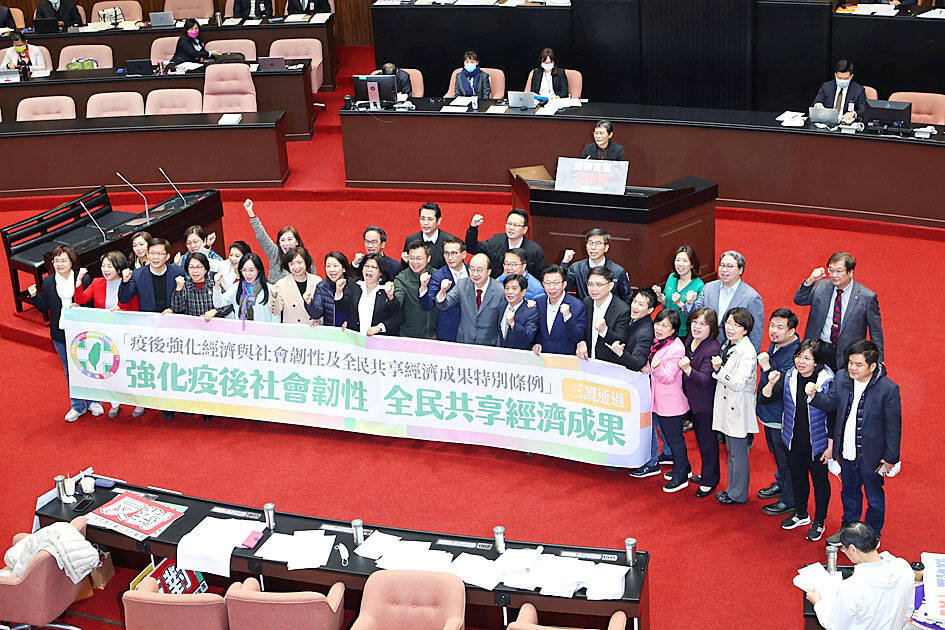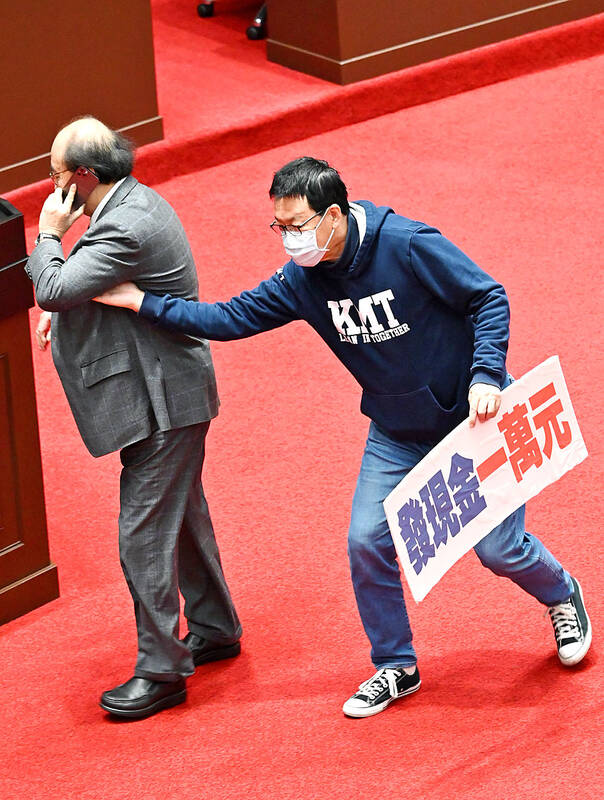The legislature yesterday passed a special bill to allocate NT$380 billion (US$12.49 billion) from last year’s surplus tax revenue to help Taiwan recover from the COVID-19 pandemic, which includes a provision to issue NT$6,000 cash handouts to all Taiwanese and tax-paying permanent residents.
In addition to the handouts, the surplus would be used to replenish the National Health Insurance fund and the Labor Insurance Fund, and subsidize the operations of state-run Taiwan Power Co (台電), according to the “special act for strengthening economic and social resilience after the pandemic and sharing economic results with the public.”
The funds could also be used to subsidize housing policies, public transportation costs, social welfare policies covering disadvantaged groups, and policies to help upgrade small and medium-sized enterprises, the bill says.

Photo: CNA
They could also be used to to attract international tourists, improve agricultural infrastructure and the rights and interests of fishers, and subsidize student loans, and cultural sectors and activities, it says.
The bill includes a sunset clause that sets the end date for the act and a matching special budget as Dec. 31, 2025.
The Cabinet must now submit a special budget request to the legislature for review before the surplus can be appropriated.

Photo: Liu Hsin-te, Taipei Times
A motion tendered by the Chinese Nationalist Party (KMT) caucus to issue NT$10,000 cash handouts instead of NT$6,000 was rejected by Democratic Progressive Party (DPP) lawmakers during the all-member hearing.
A motion sponsored by the DPP stating that all Taiwanese born before the act’s expiration date would receive the cash handout was passed as an addendum.
KMT caucus convener William Tseng (曾銘宗) expressed regret at the KMT’s motion being rejected.
The government has enough resources to fund NT$10,000 handouts, as last year’s tax surplus totaled NT$490 billion, and the surplus from 2021 can be added to the share allocated for cash handouts, Tseng said.
The Cabinet should propose plans to use the surplus to boost support for disadvantaged people, especially as real wages have been falling, he said.
President Tsai Ing-wen (蔡英文) during her New Year’s address on Jan. 1 said that a portion of last year’s tax surplus would be reserved in case of an emergency.
New Power Party Chairwoman and deputy caucus convenor Chen Jiau-hua (陳椒華) expressed concern that the planning of special budgets could become normalized, which she said would result in breaches of fiscal discipline.
The Ministry of Finance should be more precise in estimating its tax revenue to avoid overtaxing people rather than engaging in pork-barrel spending, she said.
Taiwan People’s Party caucus convener Chiu Chen-yuan (邱臣遠) said that the DPP should not have used a special budget to fund what should have been general budgetary items.
This has given rise to half-baked policies resulting from a desire to engage in pork-barrel spending ahead of next year’s presidential and legislative elections, Chiu said.
Minister Without Portfolio Lo Ping-cheng (羅秉成) said that the Cabinet would deliberate the special budget proposal tomorrow and deliver it to the legislature.
DPP caucus director-general Cheng Yun-peng (鄭運鵬) said that people would start receiving the handouts in April at the earliest.
The four legislative caucuses have agreed to ask Premier Chen Chien-jen (陳建仁) to report to the legislature on Friday next week, after which the budget request would enter committee review, Cheng said.
The request would likely be deliberated by the caucuses for about a month, given a lack of consensus on how to spend the surplus, before it is reviewed during an all-member hearing on April 10, he said.

INVESTIGATION: The case is the latest instance of a DPP figure being implicated in an espionage network accused of allegedly leaking information to Chinese intelligence Democratic Progressive Party (DPP) member Ho Jen-chieh (何仁傑) was detained and held incommunicado yesterday on suspicion of spying for China during his tenure as assistant to then-minister of foreign affairs Joseph Wu (吳釗燮). The Taipei District Prosecutors’ Office said Ho was implicated during its investigation into alleged spying activities by former Presidential Office consultant Wu Shang-yu (吳尚雨). Prosecutors said there is reason to believe Ho breached the National Security Act (國家安全法) by leaking classified Ministry of Foreign Affairs information to Chinese intelligence. Following interrogation, prosecutors petitioned the Taipei District Court to detain Ho, citing concerns over potential collusion or tampering of evidence. The

NEGOTIATIONS: The US response to the countermeasures and plans Taiwan presented has been positive, including boosting procurement and investment, the president said Taiwan is included in the first group for trade negotiations with the US, President William Lai (賴清德) said yesterday, as he seeks to shield Taiwanese exporters from a 32 percent tariff. In Washington, US Trade Representative Jamieson Greer said in an interview on Fox News on Thursday that he would speak to his Taiwanese and Israeli counterparts yesterday about tariffs after holding a long discussion with the Vietnamese earlier. US President Donald Trump on Wednesday postponed punishing levies on multiple trade partners, including Taiwan, for three months after trillions of US dollars were wiped off global markets. He has maintained a 10 percent

TRADE: The premier pledged safeguards on ‘Made in Taiwan’ labeling, anti-dumping measures and stricter export controls to strengthen its position in trade talks Products labeled “made in Taiwan” must be genuinely made in Taiwan, Premier Cho Jung-tai (卓榮泰) said yesterday, vowing to enforce strict safeguards against “origin laundering” and initiate anti-dumping investigations to prevent China dumping its products in Taiwan. Cho made the remarks in a discussion session with representatives from industries in Kaohsiung. In response to the US government’s recent announcement of “reciprocal” tariffs on its trading partners, President William Lai (賴清德) and Cho last week began a series of consultations with industry leaders nationwide to gather feedback and address concerns. Taiwanese and US officials held a videoconference on Friday evening to discuss the

PERSONAL DATA: The implicated KMT members allegedly compiled their petitions by copying names from party lists without the consent of the people concerned Judicial authorities searched six locations yesterday and questioned six people, including one elderly Chinese Nationalist Party (KMT) member and five KMT Youth League associates, about alleged signature forgery and fraud relating to their recall efforts against two Democratic Progressive Party (DPP) legislators. After launching a probe into alleged signature forgery and related fraud in the KMT’s recall effort, prosecutors received a number of complaints, including about one petition that had 1,748 signatures of voters whose family members said they had already passed away, and also voters who said they did not approve the use of their name, Taipei Deputy Chief Prosecutor